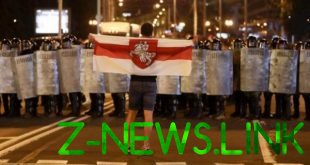
150th anniversary of the leader of the world proletariat coincided with one of the deepest crises of the capitalist system, the struggle to which he devoted his life.
If you aim to understand a particular historical figure, the anniversary article for this, probably not the most suitable genre. However, in the case of Vladimir Ulyanov (Lenin), who was born exactly 150 years ago, on 22 April 1870, perhaps I should make an exception. And not only because of the scale of the offense he, or his great literary and journalistic (after all 55 volumes) and political heritage. We take into account also the fact that the anniversary of Lenin coincided with one of the deepest crises of the capitalist system, the struggle to which he devoted his life.
Ends the current history of the coronavirus transformation of capitalism, or after the end of the pandemic, everything will return to normal, said is impossible, but that the request for a new socialism will grow, no doubt. In this sense, is to try to analyze that from Lenin’s legacy is relevant today, and that it is necessary to study only in order that in any case not to do in the future.
To say about Lenin is difficult, because for many people in our country and in the world, he still, in the words of Mayakovsky, “very much alive”. For us, it can not be “just” history. To say that the attitude to Lenin in different people the opposite, to say nothing. For some, he’s still an icon, to others a devil incarnate. Which implies that his figure is still idealized. In the sense that an objective look at the ideas and deeds of this person in most cases the place yet. Many modern scholars, bruised by Soviet propaganda, and still manage to treat it almost as a personal enemy.
Even to Stalin, that his “collectivization” (and in fact the creation of the system of state serfdom) 1929-33 years and the “great terror” of 1936-1939 killed millions of compatriots, have created a state of total control and all such researchers are much loyal. In my opinion, this is due to the fact that the motives of Stalin for them is much clearer — the lust for power, control over huge resources of the country. The motives of Lenin, if not to engage in fantasizing on this subject, and thoroughly examine the sources, they are not available, but because they look scary.
One of the most common views on Lenin is that Stalin was its direct continuation. And, paradoxically, adhere to it not only “witnesses of the Holy Ulyanov” (of course, with a plus sign), but his haters. It’s funny, but the latter in this case are strictly within the Stalinist revolutionary gospel — the famous “Short course of the CPSU (b).” It was Stalin and his propaganda in the Soviet years, argued that the Generalissimo were faithful disciple of Lenin.
Continuing this line, they argue that if Lenin had not died in 53 years, and lived another twenty years, it would have done absolutely everything that Stalin did, which of course is complete nonsense. Though, because it was completely different people. And origin, and education, and most importantly, its culture.
Lenin was a European and not hated Russia, according to some liberal and Patriotic researchers. On the contrary, all the advanced, progressive in it, he appreciated and supported. But for sure he hated what he called the “Asiatic,” and “Nations”, although the ethnic sense, in these terms, as an internationalist, he never invested. For him “Asiatic” and “Nations” — were synonymous with corruption, nepotism, suppression of individual liberty, reverence for the power and greatness of the state.
Stalin was the epitome of this “Asiatic”, which has long covered his revolutionary past, however, not flawless. It is known that a number of his party members, for example, one of the future famous “26 Baku Commissars” who were shot by interventionists into Baku, Stepan Shaumyan, suspected Koba in the work of the tsarist secret police.
Unlike Stalin, even in his youthful poems dreamed of “greatness, glory” and “to become above the mountains high”, Lenin put before itself absolutely other tasks and other professed values. Ambition, satisfaction of which gives power, Lenin was absolutely alien. Occurred from a wealthy and respected family (as you know, his father Ilya Nikolaevich had a distinguished career, dying in a rank of actual state Councilor, which corresponded to the rank of major-General in the army), as an external student graduated from the faculty of law, who possessed oratorical talent and the gift of persuasion, Vladimir Ulyanov could easily become a successful attorney, but chose this respectable and well-paid occupation risky and, as it seemed almost hopeless struggle with a vast Empire.
Finally, of course, Lenin was much more than Stalin, suffer to his comrades. Impossible to imagine that twenty years after the revolution, he gave such an unimaginable terror, that “leader of the people” and committed his party members and a huge part of the Soviet people as a whole.
In support of this thesis, we can recall that after comrades Lenin’s Bolshevik party, Gregory Zinoviev and Lev Kamenev divulged the plans of the Bolsheviks to overthrow the Provisional government, immediately after the successful October revolution of 1917 Lenin did not punish them for their betrayal (from the point of view of not only Stalin, but all the revolutionaries of that time was considered, in General, normal) sposobstvoval purpose both in high positions in the party and the state. According to Lenin, these people just had a different political point of view, nothing more.
However, we will try to answer two key questions. First, the Ulyanov was guided in its activities if career and financial considerations were alien to him? And, secondly, whether he achieved what he wanted?
First, remember the environment from which came Lenin. He was rather a typical representative of the revolutionary intelligentsia. The religious philosopher Nikolai Berdyayev, in his book “the Origins and meaning of Russian communism” wrote: “Russians out of pity, of compassion, of inability to bear the suffering was done by atheists. They are atheists because you can’t accept a Creator who made an evil, imperfect, full of suffering world. They want to create a better world in which there will be no such injustices, and suffering… B Lenin it finds its completion”.
For example, the views of one of the first Russian intellectuals, the literary critic Vissarion Belinsky, Berdyaev shows the evolution of the Russian revolutionary intelligentsia. “Belinsky imbued, in his own words, Martovskoi with love for humanity. I’m a terrible person — wrote Belinsky, — when my head rammed some kind of mystical nonsense.”
“Is that in General Russian people — adds Berdyaev, in his the head are often clogged by some kind of mystical nonsense.” According to Berdyaev, “out of compassion for the people Belinskiy ready to preach tyranny and cruelty. The blood is needed. In order to bring happiness to the majority of mankind, can carry his head at least hundreds of thousands. Belinsky, the precursor of the Bolshevik morality… Belinsky admits that if he were king, he would be a tyrant in the name of justice”.
However, Belinsky, articles, and letters which strongly influenced the minds of advanced Russian youth of that time, is not the only predecessor of Lenin and Bolshevism.
The basis of the Outlook of the future leader of the world proletariat was, of course, Marxism, which he in his youth saw tool explanation and transformation of human society. From Karl Marx, among other things, he learned and “objective-historical” approach to terror and civil war. “No matter how little heroic bourgeois society, for his birth took heroism, sacrifice, terror, civil war and the battle of the Nations” — wrote in “the 18th Brumaire of Louis Bonaparte” the founder of scientific communism. In “Capital”, the same Marx says: “violence is the midwife of every old society when it is pregnant with the new”.
However, much less is known that Lenin’s ideas influenced by the strong and the “father of anarchism” Mikhail Bakunin. The message “My Italian friends”, Bakunin wrote: “Socialism is not cruel… the Socialists, however, is not can certainly prevent, in the first days of the revolution in a fit of anger, people are not destroyed, several hundred people among the most heinous…” (M. A. Bakunin, Selected works. CIT., vol. 5, pp. 200, Pb-M, 1921).
In a letter to Sergei Nechayev, 2 June 1870 “father of anarchy” prophetically predicted: “the Russian revolution will no doubt be terrible.” In the same letter he justifies the need of a secret organization of revolutionaries, which will scatter “of their members in small groups over space Empire” and will act according to the “unified plan”. This secret organization, thought Bakunin, “pure from all covetousness, vanity, because it is impersonal, invisible, and does not cause any of the persons in (revolutionary) group, a — no benefits, no honor or official recognition of power” (M. A. Bakunin, the Philosophy. Sociology. Policy., M., 1989, p. 549).
Own this revolutionary organization, according to Bakunin, had to operate secretly, at its head should stand of the Central Committee of 3-5 people who shouldn’t know the names of even their allies.
Those who have studied the history of Bolshevism, it is painfully reminiscent of something… Lenin was certainly familiar with the basic aspects of Bakunin’s concept of revolutionary struggle. The fact that Bakunin has profoundly influenced the views of not only anarchists, but also of the people, which, as you know, belonged to the elder brother of Vladimir Ulyanov, Alexander. Not coincidentally, after the Bolsheviks came to power, the name of Bakunin, together with the names of other revolutionary thinkers as Marx, Engels, Proudhon, was broken on the famous obelisk in the Alexander garden in Moscow.
However, the ruthlessness of the Russian revolutionaries, their tendency to deep conspiracy due to their bad characters or children’s problems. Often it was just the opposite. And Bakunin, Lenin belonged to the ruling class, grew in prosperity, a good education, were loved in childhood by their parents. Just their views were formed in the state where then there was not only no political and civil liberties, but even of any freedom of thought was suppressed. For example, petrashevists, guilty only in the fact that they discussed an innocent philosophical and social issues, was sentenced to death and “graciously” commuted to penal servitude. It is clear that in the end this communication with the people, someone was very angry…
But back to Lenin. The attitude of many of those who have a positive attitude to it, not even a very sharing and understanding his views, often determine what he is, he says, set goals and achieved them. But whether he has achieved what we fought for?
For example, throughout his life, Lenin hated and despised by the Empire, fought with her in all possible ways. He certainly contributed to the fact that it collapsed. But in the end, only five years old, he was horrified to find that the Empire is reborn under the new Soviet guise.
Immediately after the conclusion at the end of the 1922 Union Treaty, proclaimed the establishment of the Soviet Union, he writes: “freedom to secede from the Union” (recorded on this agreement), which we justify ourselves will be a blank piece of paper, unable to defend foreigners from the onslaught of that really Russian man, the great Russian chauvinist, in substance a rascal and a tyrant, such as the typical Russian bureaucrat”.
Lenin fought for socialism, but after three years of civil war that communism, which he tried to impose on the country and later in Soviet propaganda was called a “war” suffered a complete collapse. In justification it can be said is that he quickly realized his mistakes. Try to build a centralized production and distribution of products in a country where there were tens of millions of small property owners, prohibiting commodity-money relations, it was absolutely killer idea. However, the completed appearance of the system of “war communism” was completed in 1919, and in 1920 he raises the question of the replacement of the surplus (the main component of “war communism”) to the tax in kind, and then, restoring the circulation of money, on tax money.
At the same time until 1929, has been terminated and attempts to drag the peasants into collective farms and communes. Began the restoration of national economy destroyed not only by war, but above all the Communist experiments on them. However, it was the restoration on the basis of the capitalist mode of production. So here he achieved his goal.
As Marx exclaimed about the most enthusiastic of his adherents: “to listen to them, and I am not a Marxist”. Lenin probably could say roughly the same about some of his followers: “listen to them, and I’m not a Leninist.”
For example, the leader of the modern Russian Communists, Gennady Zyuganov, in his report on the current the anniversary of Lenin, Lenin calls a “statesman.” Of course, not giving any quotes of the leader to confirm this. Just because such quotes do not exist. Lenin always considered the state in the Marxist-anarchist tradition as an apparatus of violence and coercion.
In one of the most original of his works “the State and revolution” Lenin, describing the state refers to the words of Engels: “a Society that is new organizes production on the basis of free and equal Association of producers will send the whole state machine where it will then be the present place: in the Museum of antiquities, next to the spinning wheel and the bronze axe.” Is that a statist approach?
However, the government under Lenin not simply revived. He has laid in him the mechanisms that have created a superstate with sverhodarennym of the human person that he wanted to release. Capitalism, driven by Stalin after the collapse of the NEP in 1929 under the concrete “Soviet” economy, gradually made its way from under her like grass through the asphalt in a black market, speculators and tsehovikov few decades, to revive and to strengthen their rights officially.
If this is the success of Lenin’s project of socialism? Obviously not.
But much of Lenin’s theoretical heritage, which until 2014 was poorly understood, today again relevant. His fiercest criticism of the “social-chauvinists” (“socialists in words, chauvinists in deeds”) today needs to be understood by those who are sincerely ready to fight against the suppression of the human personality capital and the state.
Another excerpt from “State and revolution” also sounds utterly contemporary today: “Socialism in words, chauvinism in fact, you’ll be vile servile adaptation of the “leaders of socialism” to the interests not only of “their” national bourgeoisie, but precisely of “their” state, because most of the so-called great powers have long been exploiting and enslaving a whole number of small and weak Nations.”
© 2020, paradox. All rights reserved.





